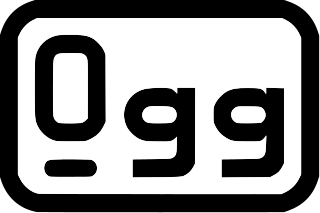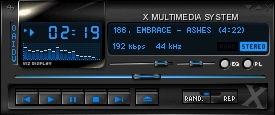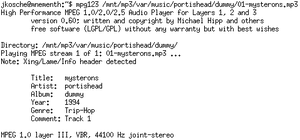
Ogg is a free, open container format maintained by the Xiph.Org Foundation. The authors of the Ogg format state that it is unrestricted by software patents and is designed to provide for efficient streaming and manipulation of high-quality digital multimedia. Its name is derived from "ogging", jargon from the computer game Netrek.

Vorbis is a free and open-source software project headed by the Xiph.Org Foundation. The project produces an audio coding format and software reference encoder/decoder (codec) for lossy audio compression. Vorbis is most commonly used in conjunction with the Ogg container format and it is therefore often referred to as Ogg Vorbis.

X Multimedia System (XMMS) is an audio player for Unix-like systems released under a free software license.

FLAC is an audio coding format for lossless compression of digital audio, developed by the Xiph.Org Foundation, and is also the name of the free software project producing the FLAC tools, the reference software package that includes a codec implementation. Digital audio compressed by FLAC's algorithm can typically be reduced to between 50 and 70 percent of its original size and decompresses to an identical copy of the original audio data.

MPlayer is a free and open-source media player software application. It is available for Linux, OS X and Microsoft Windows. Versions for OS/2, Syllable, AmigaOS, MorphOS and AROS Research Operating System are also available. A port for DOS using DJGPP is also available. Versions for the Wii Homebrew Channel and Amazon Kindle have also been developed.
Theora is a free lossy video compression format. It is developed by the Xiph.Org Foundation and distributed without licensing fees alongside their other free and open media projects, including the Vorbis audio format and the Ogg container.
Monkey's Audio is an algorithm and file format for lossless audio data compression. Lossless data compression does not discard data during the process of encoding, unlike lossy compression methods such as AAC, MP3, Vorbis, and Opus. Therefore, it may be decompressed to a file that is identical to the source material.

Xvid is a video codec library following the MPEG-4 video coding standard, specifically MPEG-4 Part 2 Advanced Simple Profile (ASP). It uses ASP features such as b-frames, global and quarter pixel motion compensation, lumi masking, trellis quantization, and H.263, MPEG and custom quantization matrices.
Xiph.Org Foundation is a nonprofit organization that produces free multimedia formats and software tools. It focuses on the Ogg family of formats, the most successful of which has been Vorbis, an open and freely licensed audio format and codec designed to compete with the patented WMA, MP3 and AAC. As of 2013, development work was focused on Daala, an open and patent-free video format and codec designed to compete with VP9 and the patented High Efficiency Video Coding.
Musepack or MPC is an open source lossy audio codec, specifically optimized for transparent compression of stereo audio at bitrates of 160–180 kbit/s. It was formerly known as MPEGplus, MPEG+ or MP+.
The following comparison of video players compares general and technical information for notable software media player programs.

ffdshow is an open-source unmaintained codec library that is mainly used for decoding of video in the MPEG-4 ASP and H.264/MPEG-4 AVC video formats, but it supports numerous other video and audio formats as well. It is free software released under GNU General Public License 2.0, runs on Windows, and is implemented as a Video for Windows (VFW) codec and a DirectShow filter.

High-Efficiency Advanced Audio Coding (HE-AAC) is an audio coding format for lossy data compression of digital audio defined as an MPEG-4 Audio profile in ISO/IEC 14496-3. It is an extension of Low Complexity AAC (AAC-LC) optimized for low-bitrate applications such as streaming audio. The usage profile HE-AAC v1 uses spectral band replication (SBR) to enhance the modified discrete cosine transform (MDCT) compression efficiency in the frequency domain. The usage profile HE-AAC v2 couples SBR with Parametric Stereo (PS) to further enhance the compression efficiency of stereo signals.

Audacious is a free and open-source audio player software with a focus on low resource use, high audio quality, and support for a wide range of audio formats. It is designed primarily for use on POSIX-compatible Unix-like operating systems, with limited support for Microsoft Windows. Audacious is the default audio player in Lubuntu and Ubuntu Studio.

K-Multimedia Player is an Adware-supported media player for Windows and iOS that can play most current audio and video formats, including VCD, HDML, DVD, AVI, MKV, Ogg, OGM, 3GP, MPEG-1/2/4, AAC, WMA 7, 8, WMV, RealMedia, FLV and QuickTime. KMPlayer shows many advertisements, including in the homepage, side panels, options panel, and as pop-up ads.

InfraRecorder is an open-source CD and DVD writing program for Microsoft Windows. First started by Christian Kindahl in the Google Summer of Code 2006, InfraRecorder uses the cdrtools software library to perform the actual burning.
A demultiplexer for digital media files, or media demultiplexer, also called a file splitter by laymen or consumer software providers, is software that demultiplexes individual elementary streams of a media file, e.g., audio, video, or subtitles and sends them to their respective decoders for actual decoding. Media demultiplexers are not decoders themselves, but are format container handlers that separate media streams from a (container) file and supply them to their respective audio, video, or subtitles decoders.

qmmp is a free and open-source cross-platform audio player that is similar to Winamp. It is written in C++ using the Qt widget toolkit for the user interface. It officially supports the operating systems Linux, FreeBSD and Microsoft Windows. In most popular Linux distributions, it is available through the standard package repositories. It is the only audio player not featuring a database that uses the Qt library.










